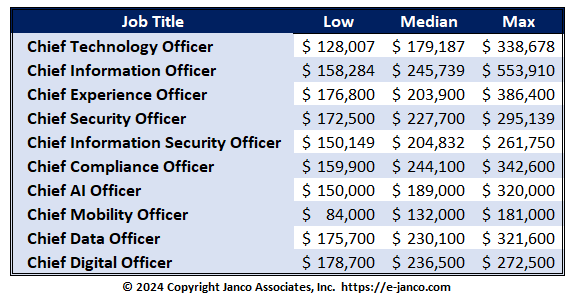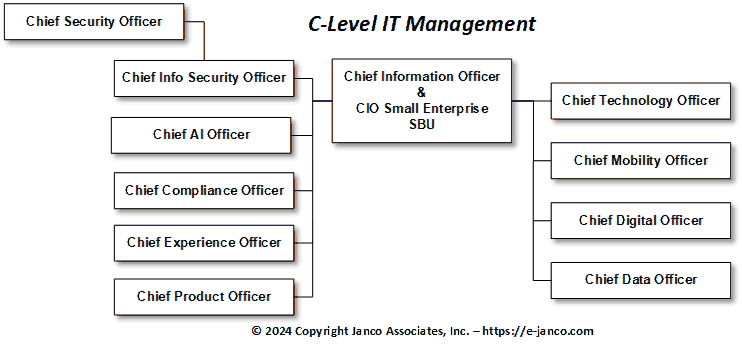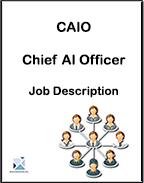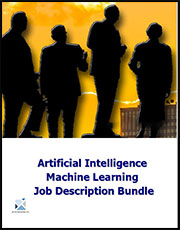C-Level jobs on the rise in IT
There are twelve (12) C- level positions in IT - Median Salary over $209K
As technology takes a leading role in many enterprises there are now twelve c-level titles that are appearing within many World-Class IT functions. Compensation for those positions exceeds $200K. The most frequently seen position titles are:
- Chief Information Officer (CIO)
- Chief Information Officer - Small Enterprise or SBU (CIO)
- Chief Artificial Intelligence (CAIO)
- Chief Compliance Officer (CCO)
- Chief Data Officer (CDaO)
- Chief Digital Officer (CDO)
- Chief Experience Officer (CXO)
- Chief Information Security Officer (CISO)
- Chief Mobility Officer (CMO)
- Chief Product Officer (CPO)
- Chief Security Officer (CSO)
- Chief Technology Officer (CTO)
Median compensation for those positions is now over $209K including base salary and bonuses. There are several cases where there are multiple individuals with these titles who are at the board level and all of them are in the senior executive management team.
Summary of responsibilities by job title
A preliminary classification of potential reporting relationships between the c-level job title and the CIO is taken from the IT Job Classification which is published as a separate document. Following is a brief description to the role of the individual in the position extracted for the full job description of the title.
IT Organization Chart - C-Level Management
Chief Information Officer (CIO)
The Chief Information Officer (CIO) is accountable for directing the information and data integrity of the enterprise and its groups and for all Information Technology functions of the enterprise. This includes all data centers, technical service centers, production scheduling functions, help desks, communication networks (voice and data), computer program development, mobile device interactions, and computer systems operations. He or she is responsible for maintaining the integrity of all electronic and optical books and records of the enterprise.
Chief Information Officer - Small Enterprise or function (CIO)
The Chief Information Officer (CIO) is accountable for directing the information and data integrity of the SBU and its business functions. This includes all IT Operation functions, help desks, communication networks (voice, data, Internet, and Intranet), computer program development, mobile device interactions, and computer processing sites. He or she is responsible for maintaining the integrity of all electronic and optical books and records of the enterprise.
Chief Artificial Intelligence (CAIO)
The Chief AI Officer (CAIO) is a C-suite executive responsible for overseeing a company’s overall strategy, acquisition, implementation, and monitoring of AI and Machine Learning (ML) technology. This role requires a deep understanding of the business, technical expertise, and regulatory awareness. The CAIO must be capable of communicating AI-related information effectively across the organization. However, the role is not solely technical; it demands diverse skills, including AI ethics, understanding, and implementation awareness.
Chief Compliance Officer (CCO)
The Corporate Compliance Officer’s role is to oversee and review all legal technology issues across the organization. This includes providing objective assessments of the company’s compliance with legislation governing the organization’s information technology systems and industry-specific regulations. The Corporate Compliance Officer also directs the development and implementation of policies and procedures to ensure that the organization’s practices remain
Chief Data Officer (CDaO)
The Chief Data Officer (CDaO) is a strategic role for many different companies in many industries because data is having a dramatic impact on business. The CDaO is not only a data expert but also a seasoned operational manager. As the role is transformational, the CDaO is responsible for the adoption of data technologies across the entire business. As with most senior executive titles, the responsibilities are set by the organization's board of directors or other authority, depending on the organization's legal structure. The CDaO is responsible for data consumer experiences across the entire enterprise and its operations.
Chief Digital Officer (CDO)
The Chief Digital (CDO) helps a company drive growth by converting traditional "analog" businesses to digital ones and oversees operations in the rapidly changing digital sectors like mobile applications, social media, and related applications, virtual goods, as well as web-based information management and marketing.
Chief Experience Officer (CXO)
The Chief Experience Officer (CXO) is the executive responsible for the overall experience of customers, suppliers, partners, associates, and internal staff with an organization’s products and services. The individual drives the enterprise’s growth in the user experience arena. They oversee operations in all user experience sectors like marketing, image setting, mobile applications, social media, related technologies, virtual goods, as well as web-based management and marketing.
Chief Information Security Officer (CISO)
The Chief Information Security Officer (CISO) is responsible for the overall direction of all security functions associated with Information Technology applications, communications (voice and data), and computing services within the enterprise. At the same time, the CISO must be aware of the implications of legislated requirements that impact security for the enterprise. This includes but is not limited to Sarbanes Oxley Section 404 requirements and ISO 2000 Standards.
Chief Mobility Officer (CMO)
The Chief Mobility Officer (CMO) is responsible for the overall direction of all mobility issues associated with Information Technology applications, communications (voice and data), and computing services within the enterprise. At the same time, the CMO must be aware of the implications of IT and industry mobility trends.
Chief Product Officer (CPO)
The Chief Product Officer is responsible for the design, development, and operations of the digital product across the entire enterprise and its operations. The Chief Product Officer helps a company drive growth in its product lines by managing the product life cycle and overseeing the rapidly changing applications environment. The Chief Product Officer is responsible for executing and evolving the enterprise’s product strategy based on performance & emerging company/consumer needs. This includes but is not limited to channel roles, content strategy, and social media drivers.
Chief Security Officer (CSO)
The Chief Security Officer oversees and coordinates security efforts across the enterprise, including information technology, human resources, communications, legal, facilities management, and other groups, to identify security initiatives and standards. The CSO works closely with the chief information officer and must have a strong working knowledge of information technology.
Chief Technology Officer (CTO)
The Chief Technology Officer’s role is to align technology vision with business strategy by integrating company processes with the appropriate technologies. The Chief Technology Officer is also responsible for all aspects of developing and implementing technology initiatives within the organization. This individual maintains existing enterprise systems while providing direction in all technology-related issues in support of information operations and core company values.
Read On Order C-Level Job Descriptions






